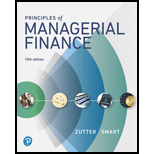
Gitman: Principl Manageri Finance_15 (15th Edition) (What's New in Finance)
15th Edition
ISBN: 9780134476315
Author: Chad J. Zutter, Scott B. Smart
Publisher: PEARSON
expand_more
expand_more
format_list_bulleted
Concept explainers
Textbook Question
Chapter 12.1, Problem 12.1RQ
Are most mutually exclusive capital budgeting projects equally risky? If you think about a firm as a portfolio of many different kinds of investments, how can the acceptance of a project change a firm’s overall risk?
Expert Solution & Answer
Want to see the full answer?
Check out a sample textbook solution
Students have asked these similar questions
Finance prob.
Need abs
Need answer n
Chapter 12 Solutions
Gitman: Principl Manageri Finance_15 (15th Edition) (What's New in Finance)
Ch. 12.1 - Are most mutually exclusive capital budgeting...Ch. 12.2 - Prob. 12.2RQCh. 12.2 - Describe how each of the following behavioral...Ch. 12.3 - Briefly explain how the following items affect the...Ch. 12.4 - Describe the basic procedures involved in using...Ch. 12.4 - Explain why a firm whose stock is actively traded...Ch. 12.4 - Prob. 12.8RQCh. 12.5 - Explain why a mere comparison of the NPVs of...Ch. 12.5 - What are real options? What are some major types...Ch. 12.5 - What is the difference between the strategic NPV...
Knowledge Booster
Learn more about
Need a deep-dive on the concept behind this application? Look no further. Learn more about this topic, finance and related others by exploring similar questions and additional content below.Similar questions
- solve this problem qn ??arrow_forwardWhich of the following is not an investment grade credit rating?* BB+ BBB+ BBB BBB-arrow_forwardCompany A has a capital structure of $80M debt and $20M equity. This year, the company reported a net income of $17M. What is Company A's return on equity?* 117.6% 21.3% 85.0% 28.3%arrow_forward
- 12. Which of the following is the formula to calculate cost of capital?* Total assets/Net debt x Cost of debt + Total assets/Equity x Cost of equity Net debt/Equity x Cost of debt + Equity/Net debt x Cost of equity Net debt x Cost of debt + Equity x Cost of equity Net debt/Total assets x Cost of debt + Equity/Total assets x Cost of equity .arrow_forwardno ai .What is the enterprise value of a business?* The market value of equity of the business The book value of equity of the business The entire value of the business without giving consideration to its capital structure The entire value of the business considering its capital structurearrow_forward10. The concept of time value of money is that* The cash flows that occur earlier are more valuable than cash flows that occur later The cash flows that occur earlier are less valuable than cash flows that occur later The longer the time cash flows are invested, the more valuable they are in the future The future value of cash flows are always higher than the present value of the cash flows .arrow_forward
arrow_back_ios
SEE MORE QUESTIONS
arrow_forward_ios
Recommended textbooks for you
 EBK CONTEMPORARY FINANCIAL MANAGEMENTFinanceISBN:9781337514835Author:MOYERPublisher:CENGAGE LEARNING - CONSIGNMENT
EBK CONTEMPORARY FINANCIAL MANAGEMENTFinanceISBN:9781337514835Author:MOYERPublisher:CENGAGE LEARNING - CONSIGNMENT Managerial AccountingAccountingISBN:9781337912020Author:Carl Warren, Ph.d. Cma William B. TaylerPublisher:South-Western College Pub
Managerial AccountingAccountingISBN:9781337912020Author:Carl Warren, Ph.d. Cma William B. TaylerPublisher:South-Western College Pub


EBK CONTEMPORARY FINANCIAL MANAGEMENT
Finance
ISBN:9781337514835
Author:MOYER
Publisher:CENGAGE LEARNING - CONSIGNMENT


Managerial Accounting
Accounting
ISBN:9781337912020
Author:Carl Warren, Ph.d. Cma William B. Tayler
Publisher:South-Western College Pub
Financial Risks - Part 1; Author: KnowledgEquity - Support for CPA;https://www.youtube.com/watch?v=mFjSYlBS-VE;License: Standard youtube license